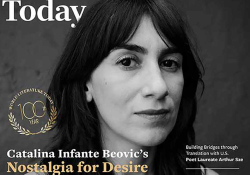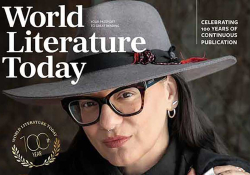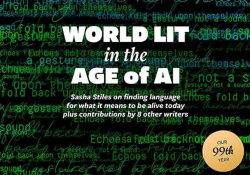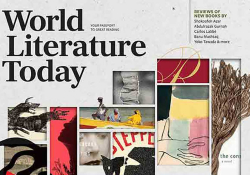Editor’s Note
 In his latest book, World Literature as Discovery: Expanding the World Literary Canon (2024), the distinguished Chinese comparatist Zhang Longxi makes an eloquent and sophisticated plea to move beyond the persistent Eurocentrism of world literature in favor of championing a more egalitarian, indeed planetary understanding of global literary production and excellence. In part, Zhang argues for a “return to literature” that moves beyond the parochialism of academic literary theory and criticism, which in its heyday had very little use for the actual poetry, fiction, and other creative works that it purported to analyze. “Let us hope,” Zhang writes, “that by returning to great works of world literature, we may achieve the revitalization of literary studies with the right balance of the East and the West, the North and the South, the past and the present, the aesthetic experience of reading with pleasure on the one hand, and the intellectual gratification of theoretical depth and insight on the other.” Drawing on a range of examples from Chinese, Indian, European, and other traditions (his discussion of the cross-cultural origins of the Cinderella folktale is especially enlightening), Zhang wagers on broadly humanistic value judgments and emphasizes the ethical stakes of world lit. Ultimately, he contends, reading world literature should be tied to a cosmopolitan cultural ethos that helps us live more enlightened and pleasurable lives.
In his latest book, World Literature as Discovery: Expanding the World Literary Canon (2024), the distinguished Chinese comparatist Zhang Longxi makes an eloquent and sophisticated plea to move beyond the persistent Eurocentrism of world literature in favor of championing a more egalitarian, indeed planetary understanding of global literary production and excellence. In part, Zhang argues for a “return to literature” that moves beyond the parochialism of academic literary theory and criticism, which in its heyday had very little use for the actual poetry, fiction, and other creative works that it purported to analyze. “Let us hope,” Zhang writes, “that by returning to great works of world literature, we may achieve the revitalization of literary studies with the right balance of the East and the West, the North and the South, the past and the present, the aesthetic experience of reading with pleasure on the one hand, and the intellectual gratification of theoretical depth and insight on the other.” Drawing on a range of examples from Chinese, Indian, European, and other traditions (his discussion of the cross-cultural origins of the Cinderella folktale is especially enlightening), Zhang wagers on broadly humanistic value judgments and emphasizes the ethical stakes of world lit. Ultimately, he contends, reading world literature should be tied to a cosmopolitan cultural ethos that helps us live more enlightened and pleasurable lives.
Yet such an ethos must go beyond mere intellectual and aesthetic satisfactions, Zhang would argue. In his compelling final chapter, “World Literature and Cosmopolitanism,” Zhang insists that reading world literature should defang the varieties of “parochialism, tribalism, ethnocentrism, and narrow-minded nationalism” that poison relationships among nations and between individuals. Zhang’s model of cosmopolitan citizenship is both ethically driven and future-oriented: “cosmopolitanism means to cultivate the feeling of a shared, common humanity with strangers, foreigners, or people outside one’s own community,” he writes. Ultimately, such a model obligates us to translate what we learn into an ethical praxis that enlarges the humanity of others as much as our own.
Zhang’s model obligates us to translate what we learn into an ethical praxis that enlarges the humanity of others as much as our own.
The current varia issue of World Literature Today once again demonstrates the editorial team’s dedication to Zhang Longxi’s ethos: publishing a magazine like WLT takes the abstraction of such a nebulous term as “world literature” and materializes it in the work of the writers featured in its pages. Part of that enactment often involves holding up a mirror to the parochialism, tribalism, and ethnocentrism at odds with Zhang’s humanist project. South African poet Vonani Bila, in a poem self-translated from Xitsonga, excoriates a neoliberal world order that commodifies and desecrates ancestral art forms, turning them into “futile ethnic tom-tom dances” for camera-wielding tourists. In her interview, Argentine neogothic author Mariana Enriquez discusses the “complete normalization” of everyday horrors that assault twenty-first citizens from all sides. “The fear of the body and of death is related to the climate crisis,” she opines. “It’s like we’re burning down our own house.” And, echoing Enriquez, Finnish writer Juhani Karila imagines a fantasy “Game Land” that quickly devolves from pleasure dome into abject horror.
By way of counterexample, the legendary Palestinian writer Mahmoud Shukair’s vision of Jerusalem as “a city dedicated to diversity, the coexistence of different religions and ideas, and the coexistence of people in tranquility, security, solidarity, and peace . . . its seven gates open to all sides confirm[ing] its nature dedicated to pluralism” closely resembles Zhang’s cosmopolitan ideal (page 49). In 2024, it’s hard not to see debased versions of ourselves when looking into the mirror of Gaza, Sudan, and Ukraine; indeed, the noble ideal of Zhang’s cosmopolitan ethos must seem like a chimera. Still, writers and artists continue to make art in the face of abjection, violence, and death itself, and—even while hovering over the abyss—we cling to the belief that art will preserve our humanity.
Daniel Simon








